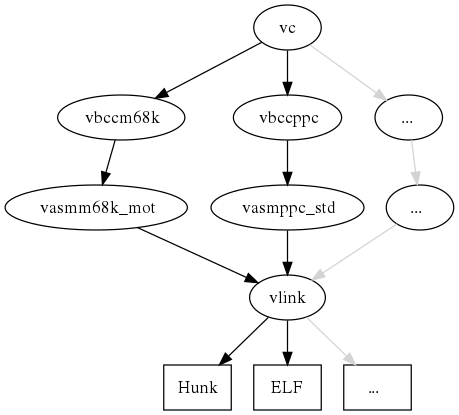vbcc
vbcc is a portable and retargetable ANSI C compiler. It supports C89 (ISO/IEC 9899:1989) as well as parts of C99 (ISO/IEC 9899:1999).
| Developer(s) | Volker Barthelmann |
|---|---|
| Initial release | 1995 |
| Stable release | 0.9g
/ October 4, 2019 |
| Written in | ANSI C |
| Operating system | Multiplatform |
| Type | Cross compiler |
| License | Freeware |
| Website | www |

It is divided into two parts. One is target-independent and the other is target-dependent. vbcc provides complete abstraction of host-arithmetic and target-arithmetic. It fully supports cross-compiling for 8-bit, 16-bit, 32-bit and 64-bit architectures.
Embedded systems are supported by features such as different pointer sizes, ROM-able code, inline assembly, bit-types, interrupt handlers, section attributes, and stack usage calculation (depending on the backend).
vbcc supports the following backends, with different degrees of maturity: 68K, ColdFire, PowerPC, 6502, 80x86 (386 and above), Alpha, C16x/ST10, 68HC12, and Z-machine.
The compiler itself can run on all common operating systems, including Windows, Mac OS X, and Unix/Linux.
Optimizations
The compiler provides a large set of high-level optimizations as well as target-specific optimizations to produce faster or smaller code. It is also able to optimize across functions and modules. Target-independent optimizations supported by vbcc include:
- cross-module function inlining
- partial inlining of recursive functions
- interprocedural dataflow analysis
- interprocedural register allocation
- register allocation for global variables
- global common subexpression elimination
- global constant propagation
- global copy propagation
- dead code elimination
- alias analysis
- loop unrolling
- induction variable elimination
- loop-invariant code motion
- loop reversal
References
- Sunitha, K.V.N. (2013). Compiler Design. Pearson India. ISBN 9-332-50029-0. page 20